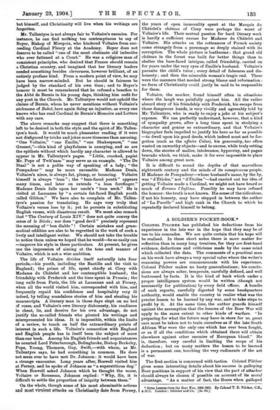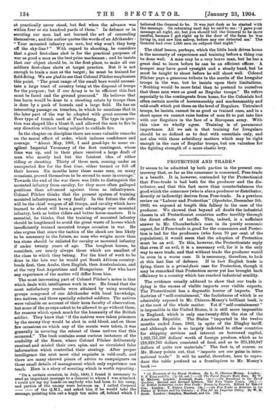COLONEL PILCHER has published his deductions from his experience in
the late war in the hope that they may be of use to his comrades. We are quite certain that his hope will be realised. In these short notes there is more matter for reflection than in many long treatises, for they are first-hand evidence, deductions and criticisms made by the same mind which collected the data. The comments of a practical man on his work have always a very special value where the writer's reasoning powers are commensurate with his experience. Colonel Pilcher makes no hasty generalisations; his conclu- sions are always sober, temperate, carefully defined, and well buttressed by facts. It is the kind of book which under a proper intelligence system would be written (though not necessarily for publication) by every field officer. A bundle of such reports, carefully digested by some headquarters authority, would enable the country to realise what was the precise lesson to be learned by any war, and to take steps to profit by it. At the same time, the author guards himself against the assumption that the lessons of the Boer War will apply to the same extent to other kinds of warfare. "In preparing for what the future may have in store for Us, great care must be taken not to train ourselves as if the late South African War were the only one which has ever been fought, or as if all the conditions which obtained there will obtain elsewhere against other enemies of European blood." He is, therefore, very careful in limiting the scope of his deduction ; but on many matters the lesson to be learned is a permanent one, touching the very rudiments of the art of war.
The first section is concerned with tactics. Colonel Pilcher gives some interesting details about his success in galloping Boer positions in support of his view that the part of attacker should always be chosen if possible on account of its moral advantage. "As a matter of fact, the Boers when galloped
• Soma Leuons front the Boer War, 1890-1002. By Colonel T. D. Nicker, C.D., A.D.C. London labister and Co. 1.213. 6d.] ab practically never stood, but fled when the advance was within four or six hundred yards of them." In defence or in scouting our men had not learned the art of concealing themselves ; and the author quotes the words of an Afrikander : "Your mounted infantry are men, but why won't they keep
off the sky-line " With regard to shooting, he considers that a good first-class shot is for the practical purposes of war as good a man as the best prize marksman ; and he insists that our object should be, in the first place, to make all our soldiers first-class shots at target practice. But it is not enough to train a man at the target ; he must be trained for field-firing. We are glad to see that Colonel Filcher emphasises this point. "The great range of the small bore would necessi-
tate a large tract of country being at the disposal of troops for the purpose ; but if our Army is to be efficient this fact
must be faced and the ground procured." He believes that less harm would be done to a shooting estate by troops than is done by a pack of hounds and a large field. He has an interesting passage on trenches, in which he mentions that in the later part of the war he adopted with great success the Boer type of trench used at Pa.ardeberg. The type in ques- tion was shaped like a blunt S, and allowed the men to fire in any direction without being subject to enfilade fire.
In the chapter on discipline there are some valuable remarks on the moral effect of order, which induces confidence and courage. "About May, 1901, I said good-bye to some ex- cpllent Imperial Yeomanry of the first contingent, whose time was up, and in their place received a large draft of men who mostly had but the faintest idea of either riding or shooting. Thirty of these men, coming under an
unexpected fire for the first time, either turned or fell off their horses. Six months later these same men, on many occasions, proved themselves to be second to none in courage."
Towards the end of the war there was little to distinguish the mounted infantry from cavalry, for they more often galloped positions than advanced against them as infantrymen.
Colonel Filcher thinks that the present system of training
mounted infantrymen is very faulty. In the future the rifle will be the chief weapon of all troops, and cavalry which have learned to shoot will have a great advantage over mounted infantry, both as better riders and better horse-masters. It is essential, be thinks, that the training of mounted infantry
should be lengthened to avoid the great waste of horses which insufficiently trained mounted troops occasion in war. He also argues that since the tactics of the shock are less likely to be necessary in the future, no man who weighs more than ten stone should be enlisted for cavalry or mounted infantry if under twenty years of age. The toughest horses, he considers, are nearly always those which are smallest of the class to which they belong. For the kind of work to be done in the late war he would put South African country- breds first, then Arabs, then English, then Australasians, and at the very foot Argentines and Hungarians. Few who have any experience of the matter will differ from him.
The most interesting part of Colonel Pilcher's notes is that which deals with intelligence work in war. He found that the most satisfactory restate were attained by using scouting groups composed of one Afrikander with local knowledge, two natives, and three specially selected soldiers. The natives were valuable on account of their keen faculty of observation, but some of the groups asked to be allowed to go without them, for reasons which speak much for the humanity of the British soldier. They knew that "if the natives were taken prisoners by the enemy they would be shot in cold blood, and on those few occasions, on which any of the scouts were taken, it was generally in covering the retreat of these natives that this occurred." The book contains some curious instances of the credulity of the Boers, where Colonel Pilcher deliberately received and misled their own spies, and so circulated false information which controlled their strategy. After proper intelligence the next most vital requisite is veld-craft, and there are many shrewd pieces of advice to campaigners on those small details of management which only experience can teach. Here is a story of scouting which is worth repeating;
"On a certain occasion, in July, 1900, I found it necessary to send an important message to a General to whom I was attached. I could not lay inY hands on anybody who had been to his camp, and parties of the enemy were between us. I called Corporal
of the and asked him if he would take the message, pointing him out a kopje ten miles off, behind which I
believed the General to be. It was just dusk as he started with the message. On returning next day he said to me : I gave your message all right, sir, but you should tell the General to be more careful, because I got right up to the door of the farm he was living in, and saw him asleep, before any one detected me.' The General had over 1,000 men on outpost that night."
The chief lesson, perhaps, which the little book drives home is the necessity of experience and training before a thing can be done well. A man may be a very brave man, but he has a great deal to learn before he can be an efficient officer. A trooper may have good eyesight and a steady band, but he must be taught to shoot before he will shoot well. Colonel Filcher pays a generous tribute to the merits of the Irregular troops in the war, but he insists upon their limitations. "'Nothing would be more fatal than to pretend to ourselves
that these men were as good as Regular troops." He refers especially to the contingents from home, for the Colonials had often certain merits of horsemanship and marksmanship and veld-craft which put them on the level of Regulars. Untrained troops, he insists, cannot be as good as trained ones, and in a short space we cannot raise bodies of men fit to put into line with our Regulars in the face of a European army. With this view we wholly agree. Training is of paramount importance. All we ask is that training for Irregulars should be so defined as to deal with essentials only, and not also with those subsidiary matters which may be right enough in the case of Regular troops, but are valueless for the fighting strength of a more elastic levy.











































 Previous page
Previous page